K2031611 - Emotional Learning Environment Audit & Transitions
VerifiedAdded on 2023/06/15
|12
|4138
|385
Report
AI Summary
This report presents an audit of an emotional learning environment, focusing on leading through transitions, particularly within the context of early years education. The audit identifies strengths and areas for development, referencing relevant policies such as the 'Nappy Changing Policy' and 'Transitional Policy,' and considering the involvement of children, families, colleagues, and other professionals. The audit focuses on key features such as meeting basic needs, snack time practices, and the importance of children's voices. It critically analyzes the role of snack time in developing physical, social, and personal skills, while also addressing potential drawbacks like distraction. The report highlights the significance of communication, safety, and security, referencing the Childcare Act 2006 and the EYFS framework. It also discusses the importance of outdoor learning, healthy snacking, and managing transitions, drawing upon theories like Winnicott’s theory and the Children Act 1989. The analysis includes horizontal and vertical transitions, the use of transitional objects, and the emotional connection between children and their parents, particularly during snack time.
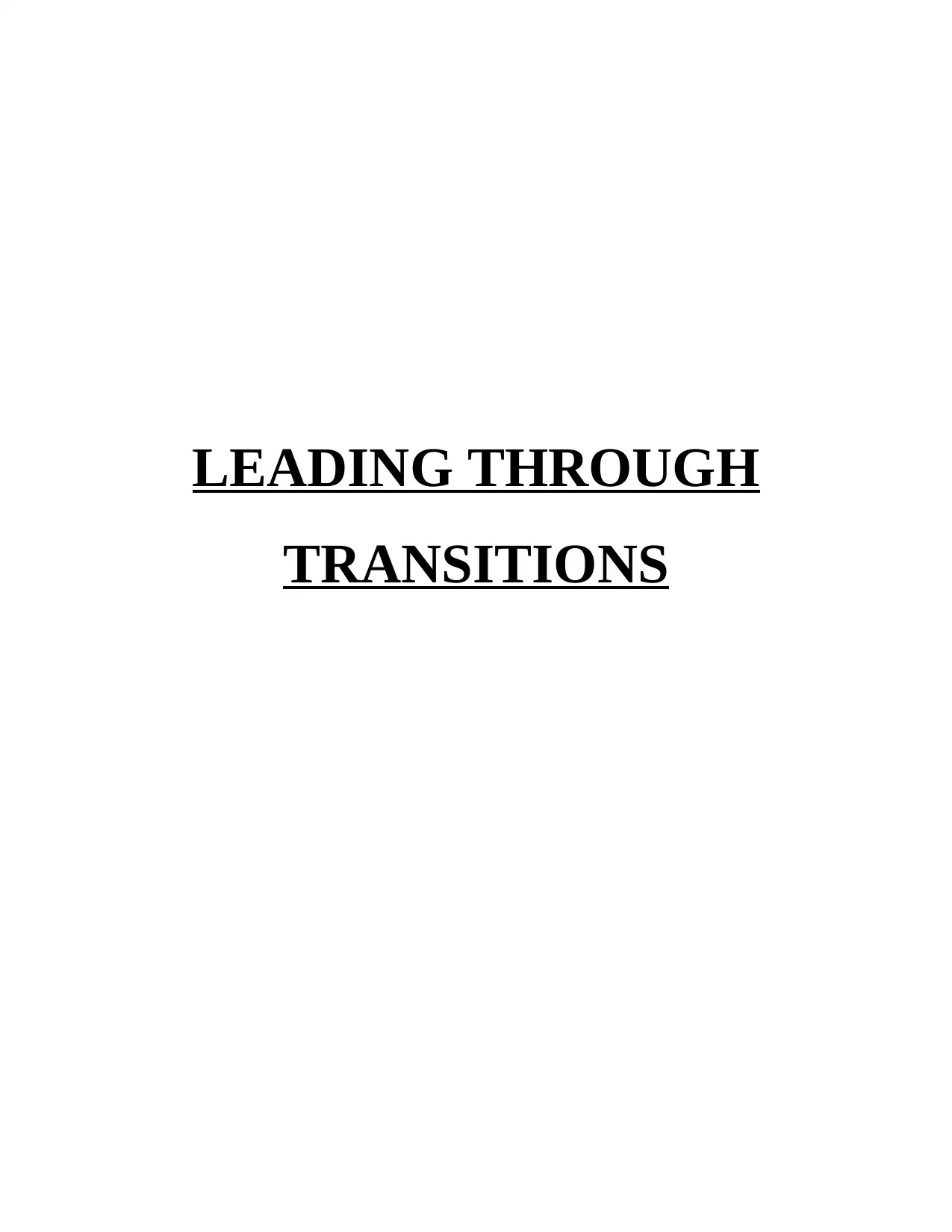
LEADING THROUGH
TRANSITIONS
TRANSITIONS
Paraphrase This Document
Need a fresh take? Get an instant paraphrase of this document with our AI Paraphraser
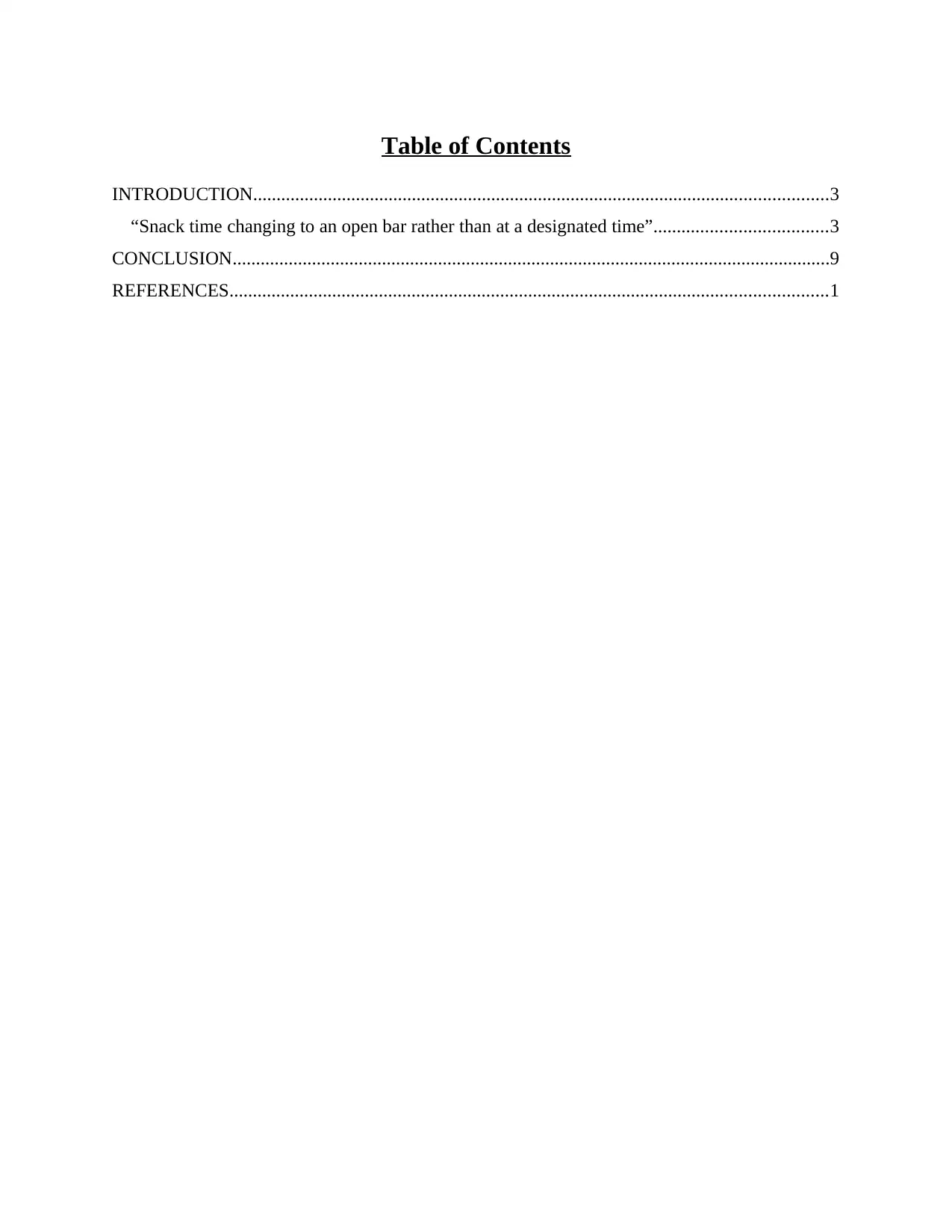
Table of Contents
INTRODUCTION...........................................................................................................................3
“Snack time changing to an open bar rather than at a designated time”.....................................3
CONCLUSION................................................................................................................................9
REFERENCES................................................................................................................................1
INTRODUCTION...........................................................................................................................3
“Snack time changing to an open bar rather than at a designated time”.....................................3
CONCLUSION................................................................................................................................9
REFERENCES................................................................................................................................1
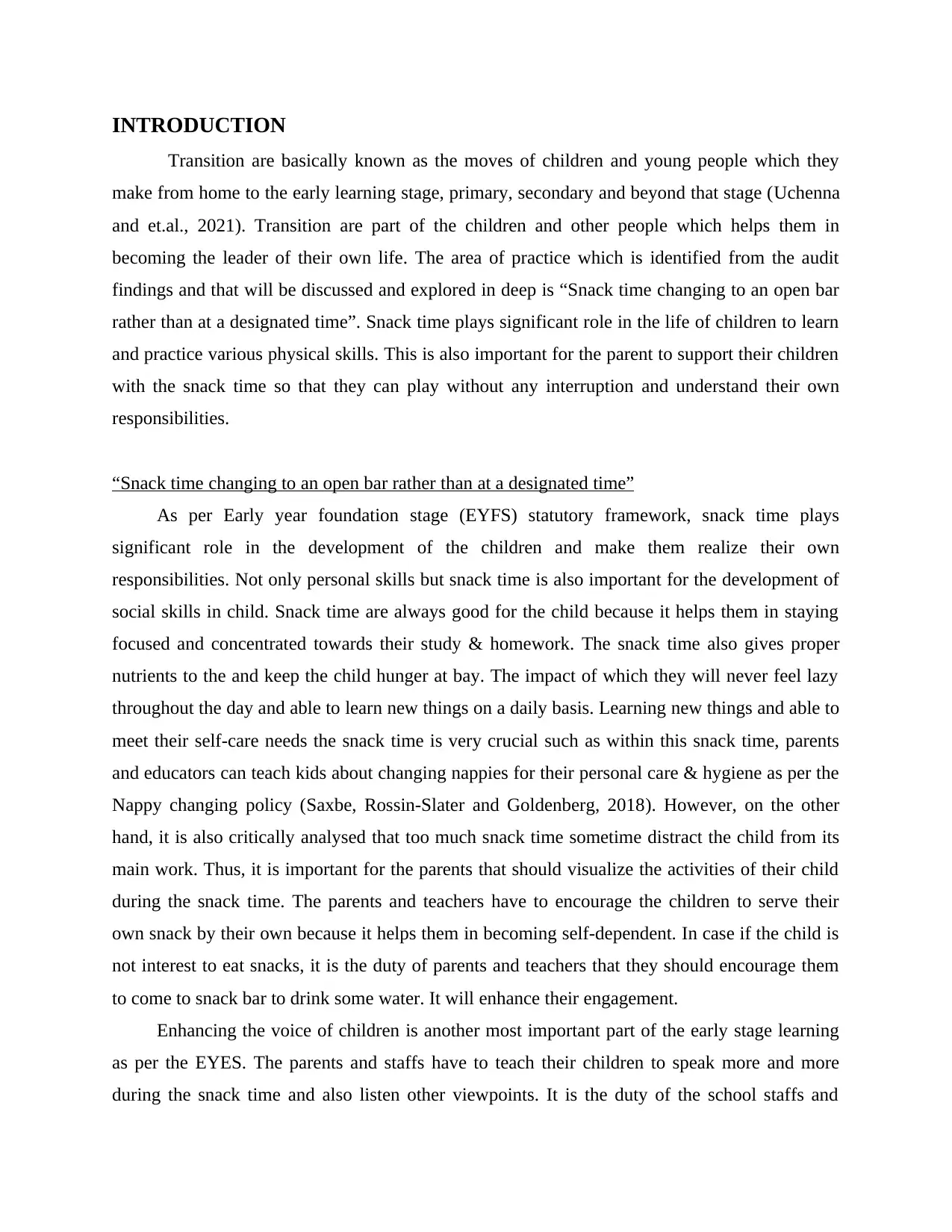
INTRODUCTION
Transition are basically known as the moves of children and young people which they
make from home to the early learning stage, primary, secondary and beyond that stage (Uchenna
and et.al., 2021). Transition are part of the children and other people which helps them in
becoming the leader of their own life. The area of practice which is identified from the audit
findings and that will be discussed and explored in deep is “Snack time changing to an open bar
rather than at a designated time”. Snack time plays significant role in the life of children to learn
and practice various physical skills. This is also important for the parent to support their children
with the snack time so that they can play without any interruption and understand their own
responsibilities.
“Snack time changing to an open bar rather than at a designated time”
As per Early year foundation stage (EYFS) statutory framework, snack time plays
significant role in the development of the children and make them realize their own
responsibilities. Not only personal skills but snack time is also important for the development of
social skills in child. Snack time are always good for the child because it helps them in staying
focused and concentrated towards their study & homework. The snack time also gives proper
nutrients to the and keep the child hunger at bay. The impact of which they will never feel lazy
throughout the day and able to learn new things on a daily basis. Learning new things and able to
meet their self-care needs the snack time is very crucial such as within this snack time, parents
and educators can teach kids about changing nappies for their personal care & hygiene as per the
Nappy changing policy (Saxbe, Rossin-Slater and Goldenberg, 2018). However, on the other
hand, it is also critically analysed that too much snack time sometime distract the child from its
main work. Thus, it is important for the parents that should visualize the activities of their child
during the snack time. The parents and teachers have to encourage the children to serve their
own snack by their own because it helps them in becoming self-dependent. In case if the child is
not interest to eat snacks, it is the duty of parents and teachers that they should encourage them
to come to snack bar to drink some water. It will enhance their engagement.
Enhancing the voice of children is another most important part of the early stage learning
as per the EYES. The parents and staffs have to teach their children to speak more and more
during the snack time and also listen other viewpoints. It is the duty of the school staffs and
Transition are basically known as the moves of children and young people which they
make from home to the early learning stage, primary, secondary and beyond that stage (Uchenna
and et.al., 2021). Transition are part of the children and other people which helps them in
becoming the leader of their own life. The area of practice which is identified from the audit
findings and that will be discussed and explored in deep is “Snack time changing to an open bar
rather than at a designated time”. Snack time plays significant role in the life of children to learn
and practice various physical skills. This is also important for the parent to support their children
with the snack time so that they can play without any interruption and understand their own
responsibilities.
“Snack time changing to an open bar rather than at a designated time”
As per Early year foundation stage (EYFS) statutory framework, snack time plays
significant role in the development of the children and make them realize their own
responsibilities. Not only personal skills but snack time is also important for the development of
social skills in child. Snack time are always good for the child because it helps them in staying
focused and concentrated towards their study & homework. The snack time also gives proper
nutrients to the and keep the child hunger at bay. The impact of which they will never feel lazy
throughout the day and able to learn new things on a daily basis. Learning new things and able to
meet their self-care needs the snack time is very crucial such as within this snack time, parents
and educators can teach kids about changing nappies for their personal care & hygiene as per the
Nappy changing policy (Saxbe, Rossin-Slater and Goldenberg, 2018). However, on the other
hand, it is also critically analysed that too much snack time sometime distract the child from its
main work. Thus, it is important for the parents that should visualize the activities of their child
during the snack time. The parents and teachers have to encourage the children to serve their
own snack by their own because it helps them in becoming self-dependent. In case if the child is
not interest to eat snacks, it is the duty of parents and teachers that they should encourage them
to come to snack bar to drink some water. It will enhance their engagement.
Enhancing the voice of children is another most important part of the early stage learning
as per the EYES. The parents and staffs have to teach their children to speak more and more
during the snack time and also listen other viewpoints. It is the duty of the school staffs and
⊘ This is a preview!⊘
Do you want full access?
Subscribe today to unlock all pages.

Trusted by 1+ million students worldwide
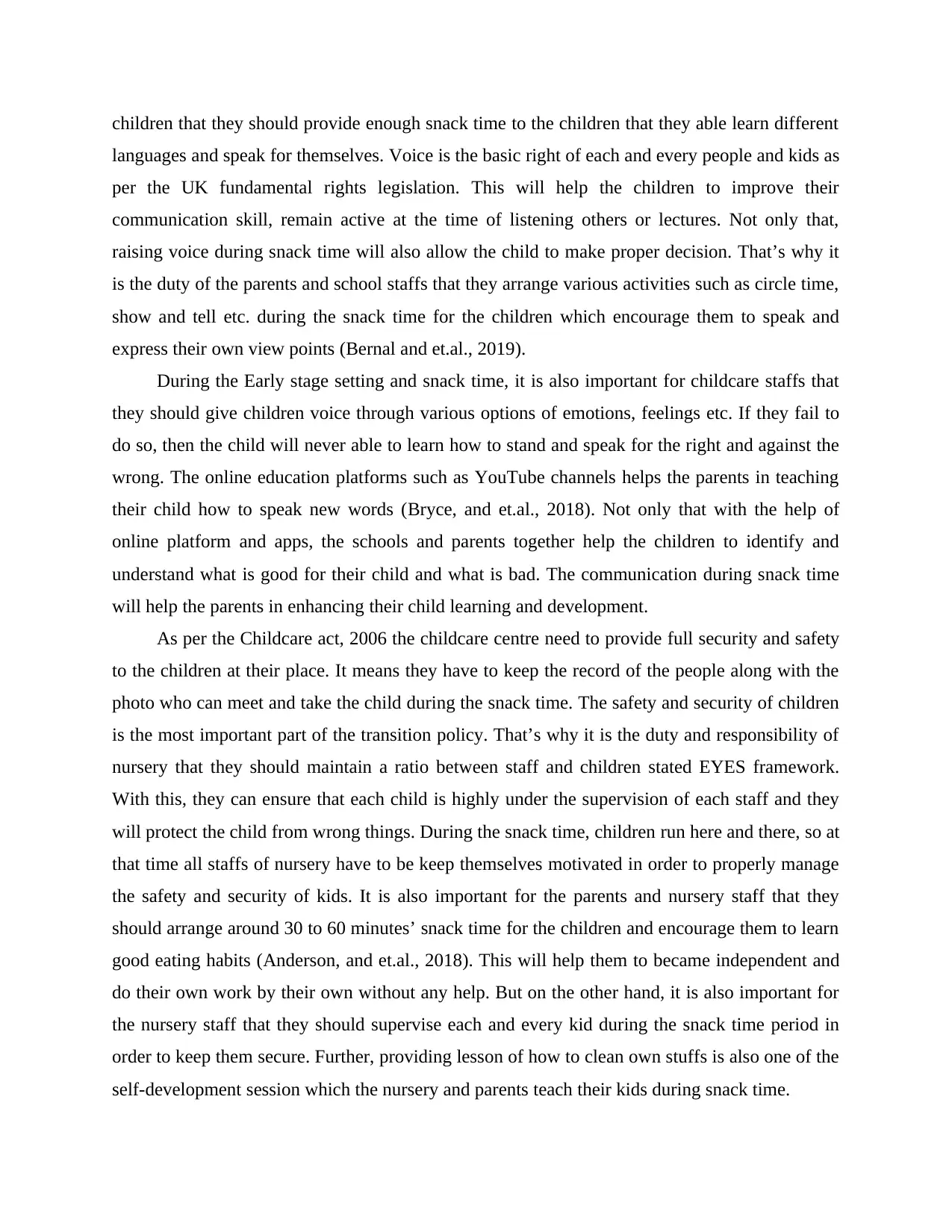
children that they should provide enough snack time to the children that they able learn different
languages and speak for themselves. Voice is the basic right of each and every people and kids as
per the UK fundamental rights legislation. This will help the children to improve their
communication skill, remain active at the time of listening others or lectures. Not only that,
raising voice during snack time will also allow the child to make proper decision. That’s why it
is the duty of the parents and school staffs that they arrange various activities such as circle time,
show and tell etc. during the snack time for the children which encourage them to speak and
express their own view points (Bernal and et.al., 2019).
During the Early stage setting and snack time, it is also important for childcare staffs that
they should give children voice through various options of emotions, feelings etc. If they fail to
do so, then the child will never able to learn how to stand and speak for the right and against the
wrong. The online education platforms such as YouTube channels helps the parents in teaching
their child how to speak new words (Bryce, and et.al., 2018). Not only that with the help of
online platform and apps, the schools and parents together help the children to identify and
understand what is good for their child and what is bad. The communication during snack time
will help the parents in enhancing their child learning and development.
As per the Childcare act, 2006 the childcare centre need to provide full security and safety
to the children at their place. It means they have to keep the record of the people along with the
photo who can meet and take the child during the snack time. The safety and security of children
is the most important part of the transition policy. That’s why it is the duty and responsibility of
nursery that they should maintain a ratio between staff and children stated EYES framework.
With this, they can ensure that each child is highly under the supervision of each staff and they
will protect the child from wrong things. During the snack time, children run here and there, so at
that time all staffs of nursery have to be keep themselves motivated in order to properly manage
the safety and security of kids. It is also important for the parents and nursery staff that they
should arrange around 30 to 60 minutes’ snack time for the children and encourage them to learn
good eating habits (Anderson, and et.al., 2018). This will help them to became independent and
do their own work by their own without any help. But on the other hand, it is also important for
the nursery staff that they should supervise each and every kid during the snack time period in
order to keep them secure. Further, providing lesson of how to clean own stuffs is also one of the
self-development session which the nursery and parents teach their kids during snack time.
languages and speak for themselves. Voice is the basic right of each and every people and kids as
per the UK fundamental rights legislation. This will help the children to improve their
communication skill, remain active at the time of listening others or lectures. Not only that,
raising voice during snack time will also allow the child to make proper decision. That’s why it
is the duty of the parents and school staffs that they arrange various activities such as circle time,
show and tell etc. during the snack time for the children which encourage them to speak and
express their own view points (Bernal and et.al., 2019).
During the Early stage setting and snack time, it is also important for childcare staffs that
they should give children voice through various options of emotions, feelings etc. If they fail to
do so, then the child will never able to learn how to stand and speak for the right and against the
wrong. The online education platforms such as YouTube channels helps the parents in teaching
their child how to speak new words (Bryce, and et.al., 2018). Not only that with the help of
online platform and apps, the schools and parents together help the children to identify and
understand what is good for their child and what is bad. The communication during snack time
will help the parents in enhancing their child learning and development.
As per the Childcare act, 2006 the childcare centre need to provide full security and safety
to the children at their place. It means they have to keep the record of the people along with the
photo who can meet and take the child during the snack time. The safety and security of children
is the most important part of the transition policy. That’s why it is the duty and responsibility of
nursery that they should maintain a ratio between staff and children stated EYES framework.
With this, they can ensure that each child is highly under the supervision of each staff and they
will protect the child from wrong things. During the snack time, children run here and there, so at
that time all staffs of nursery have to be keep themselves motivated in order to properly manage
the safety and security of kids. It is also important for the parents and nursery staff that they
should arrange around 30 to 60 minutes’ snack time for the children and encourage them to learn
good eating habits (Anderson, and et.al., 2018). This will help them to became independent and
do their own work by their own without any help. But on the other hand, it is also important for
the nursery staff that they should supervise each and every kid during the snack time period in
order to keep them secure. Further, providing lesson of how to clean own stuffs is also one of the
self-development session which the nursery and parents teach their kids during snack time.
Paraphrase This Document
Need a fresh take? Get an instant paraphrase of this document with our AI Paraphraser
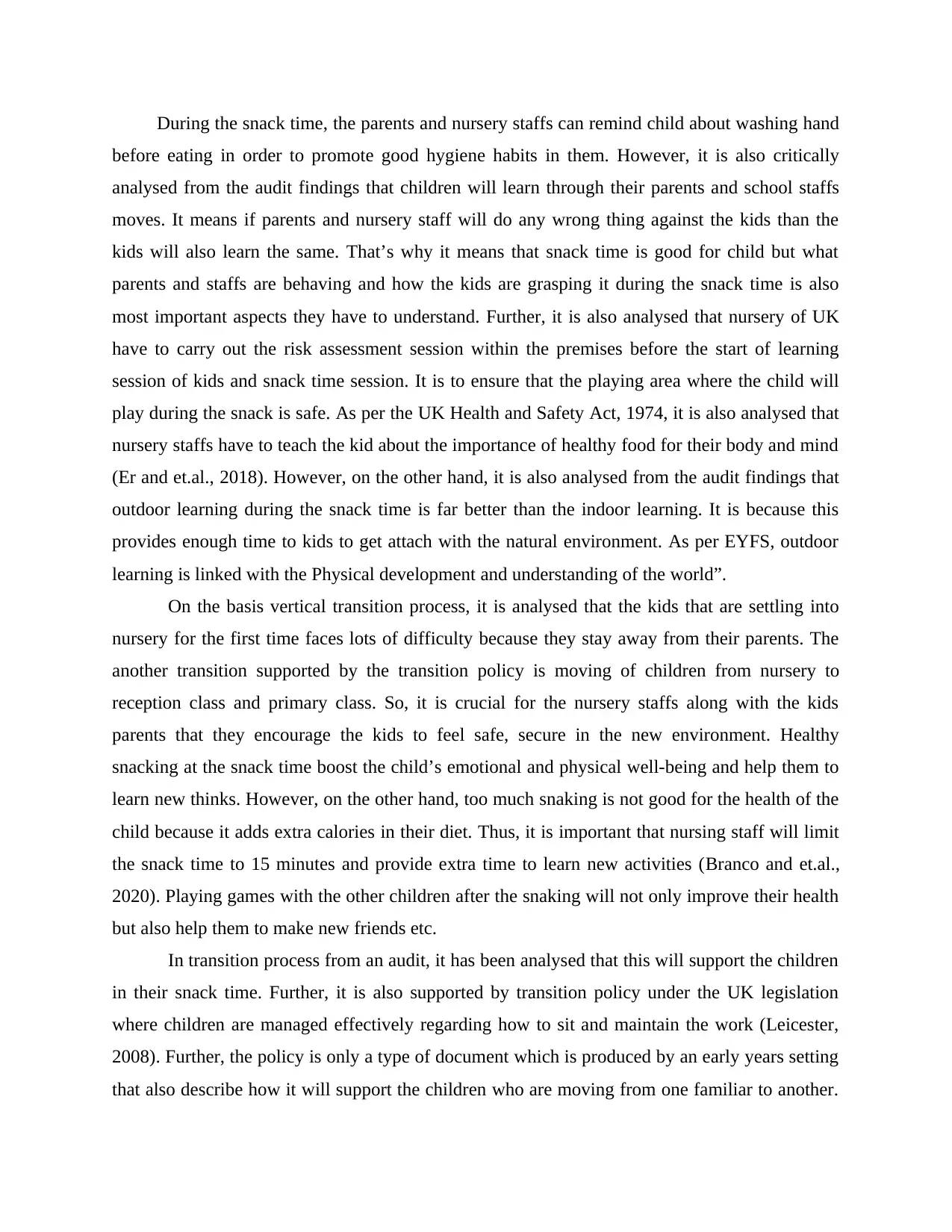
During the snack time, the parents and nursery staffs can remind child about washing hand
before eating in order to promote good hygiene habits in them. However, it is also critically
analysed from the audit findings that children will learn through their parents and school staffs
moves. It means if parents and nursery staff will do any wrong thing against the kids than the
kids will also learn the same. That’s why it means that snack time is good for child but what
parents and staffs are behaving and how the kids are grasping it during the snack time is also
most important aspects they have to understand. Further, it is also analysed that nursery of UK
have to carry out the risk assessment session within the premises before the start of learning
session of kids and snack time session. It is to ensure that the playing area where the child will
play during the snack is safe. As per the UK Health and Safety Act, 1974, it is also analysed that
nursery staffs have to teach the kid about the importance of healthy food for their body and mind
(Er and et.al., 2018). However, on the other hand, it is also analysed from the audit findings that
outdoor learning during the snack time is far better than the indoor learning. It is because this
provides enough time to kids to get attach with the natural environment. As per EYFS, outdoor
learning is linked with the Physical development and understanding of the world”.
On the basis vertical transition process, it is analysed that the kids that are settling into
nursery for the first time faces lots of difficulty because they stay away from their parents. The
another transition supported by the transition policy is moving of children from nursery to
reception class and primary class. So, it is crucial for the nursery staffs along with the kids
parents that they encourage the kids to feel safe, secure in the new environment. Healthy
snacking at the snack time boost the child’s emotional and physical well-being and help them to
learn new thinks. However, on the other hand, too much snaking is not good for the health of the
child because it adds extra calories in their diet. Thus, it is important that nursing staff will limit
the snack time to 15 minutes and provide extra time to learn new activities (Branco and et.al.,
2020). Playing games with the other children after the snaking will not only improve their health
but also help them to make new friends etc.
In transition process from an audit, it has been analysed that this will support the children
in their snack time. Further, it is also supported by transition policy under the UK legislation
where children are managed effectively regarding how to sit and maintain the work (Leicester,
2008). Further, the policy is only a type of document which is produced by an early years setting
that also describe how it will support the children who are moving from one familiar to another.
before eating in order to promote good hygiene habits in them. However, it is also critically
analysed from the audit findings that children will learn through their parents and school staffs
moves. It means if parents and nursery staff will do any wrong thing against the kids than the
kids will also learn the same. That’s why it means that snack time is good for child but what
parents and staffs are behaving and how the kids are grasping it during the snack time is also
most important aspects they have to understand. Further, it is also analysed that nursery of UK
have to carry out the risk assessment session within the premises before the start of learning
session of kids and snack time session. It is to ensure that the playing area where the child will
play during the snack is safe. As per the UK Health and Safety Act, 1974, it is also analysed that
nursery staffs have to teach the kid about the importance of healthy food for their body and mind
(Er and et.al., 2018). However, on the other hand, it is also analysed from the audit findings that
outdoor learning during the snack time is far better than the indoor learning. It is because this
provides enough time to kids to get attach with the natural environment. As per EYFS, outdoor
learning is linked with the Physical development and understanding of the world”.
On the basis vertical transition process, it is analysed that the kids that are settling into
nursery for the first time faces lots of difficulty because they stay away from their parents. The
another transition supported by the transition policy is moving of children from nursery to
reception class and primary class. So, it is crucial for the nursery staffs along with the kids
parents that they encourage the kids to feel safe, secure in the new environment. Healthy
snacking at the snack time boost the child’s emotional and physical well-being and help them to
learn new thinks. However, on the other hand, too much snaking is not good for the health of the
child because it adds extra calories in their diet. Thus, it is important that nursing staff will limit
the snack time to 15 minutes and provide extra time to learn new activities (Branco and et.al.,
2020). Playing games with the other children after the snaking will not only improve their health
but also help them to make new friends etc.
In transition process from an audit, it has been analysed that this will support the children
in their snack time. Further, it is also supported by transition policy under the UK legislation
where children are managed effectively regarding how to sit and maintain the work (Leicester,
2008). Further, the policy is only a type of document which is produced by an early years setting
that also describe how it will support the children who are moving from one familiar to another.
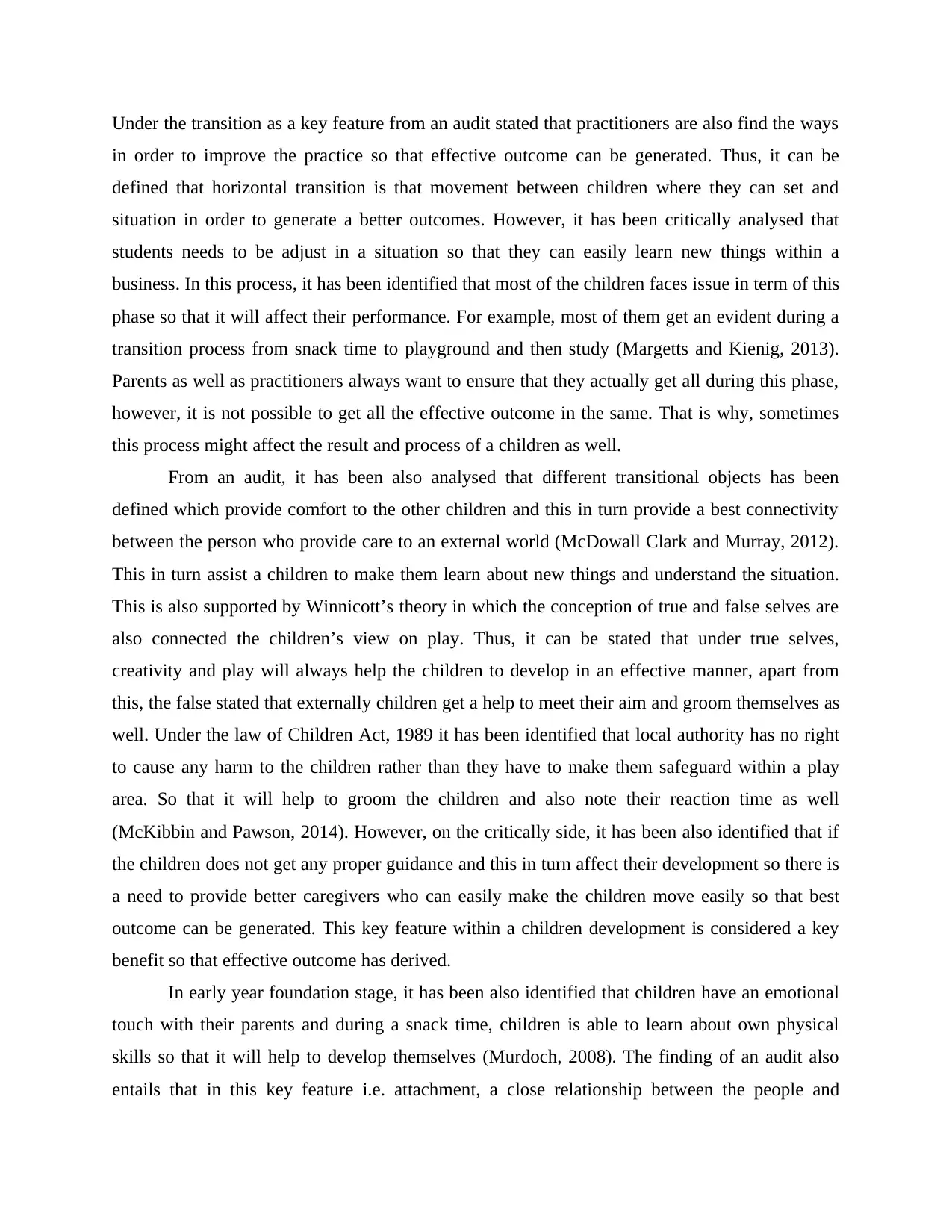
Under the transition as a key feature from an audit stated that practitioners are also find the ways
in order to improve the practice so that effective outcome can be generated. Thus, it can be
defined that horizontal transition is that movement between children where they can set and
situation in order to generate a better outcomes. However, it has been critically analysed that
students needs to be adjust in a situation so that they can easily learn new things within a
business. In this process, it has been identified that most of the children faces issue in term of this
phase so that it will affect their performance. For example, most of them get an evident during a
transition process from snack time to playground and then study (Margetts and Kienig, 2013).
Parents as well as practitioners always want to ensure that they actually get all during this phase,
however, it is not possible to get all the effective outcome in the same. That is why, sometimes
this process might affect the result and process of a children as well.
From an audit, it has been also analysed that different transitional objects has been
defined which provide comfort to the other children and this in turn provide a best connectivity
between the person who provide care to an external world (McDowall Clark and Murray, 2012).
This in turn assist a children to make them learn about new things and understand the situation.
This is also supported by Winnicott’s theory in which the conception of true and false selves are
also connected the children’s view on play. Thus, it can be stated that under true selves,
creativity and play will always help the children to develop in an effective manner, apart from
this, the false stated that externally children get a help to meet their aim and groom themselves as
well. Under the law of Children Act, 1989 it has been identified that local authority has no right
to cause any harm to the children rather than they have to make them safeguard within a play
area. So that it will help to groom the children and also note their reaction time as well
(McKibbin and Pawson, 2014). However, on the critically side, it has been also identified that if
the children does not get any proper guidance and this in turn affect their development so there is
a need to provide better caregivers who can easily make the children move easily so that best
outcome can be generated. This key feature within a children development is considered a key
benefit so that effective outcome has derived.
In early year foundation stage, it has been also identified that children have an emotional
touch with their parents and during a snack time, children is able to learn about own physical
skills so that it will help to develop themselves (Murdoch, 2008). The finding of an audit also
entails that in this key feature i.e. attachment, a close relationship between the people and
in order to improve the practice so that effective outcome can be generated. Thus, it can be
defined that horizontal transition is that movement between children where they can set and
situation in order to generate a better outcomes. However, it has been critically analysed that
students needs to be adjust in a situation so that they can easily learn new things within a
business. In this process, it has been identified that most of the children faces issue in term of this
phase so that it will affect their performance. For example, most of them get an evident during a
transition process from snack time to playground and then study (Margetts and Kienig, 2013).
Parents as well as practitioners always want to ensure that they actually get all during this phase,
however, it is not possible to get all the effective outcome in the same. That is why, sometimes
this process might affect the result and process of a children as well.
From an audit, it has been also analysed that different transitional objects has been
defined which provide comfort to the other children and this in turn provide a best connectivity
between the person who provide care to an external world (McDowall Clark and Murray, 2012).
This in turn assist a children to make them learn about new things and understand the situation.
This is also supported by Winnicott’s theory in which the conception of true and false selves are
also connected the children’s view on play. Thus, it can be stated that under true selves,
creativity and play will always help the children to develop in an effective manner, apart from
this, the false stated that externally children get a help to meet their aim and groom themselves as
well. Under the law of Children Act, 1989 it has been identified that local authority has no right
to cause any harm to the children rather than they have to make them safeguard within a play
area. So that it will help to groom the children and also note their reaction time as well
(McKibbin and Pawson, 2014). However, on the critically side, it has been also identified that if
the children does not get any proper guidance and this in turn affect their development so there is
a need to provide better caregivers who can easily make the children move easily so that best
outcome can be generated. This key feature within a children development is considered a key
benefit so that effective outcome has derived.
In early year foundation stage, it has been also identified that children have an emotional
touch with their parents and during a snack time, children is able to learn about own physical
skills so that it will help to develop themselves (Murdoch, 2008). The finding of an audit also
entails that in this key feature i.e. attachment, a close relationship between the people and
⊘ This is a preview!⊘
Do you want full access?
Subscribe today to unlock all pages.

Trusted by 1+ million students worldwide
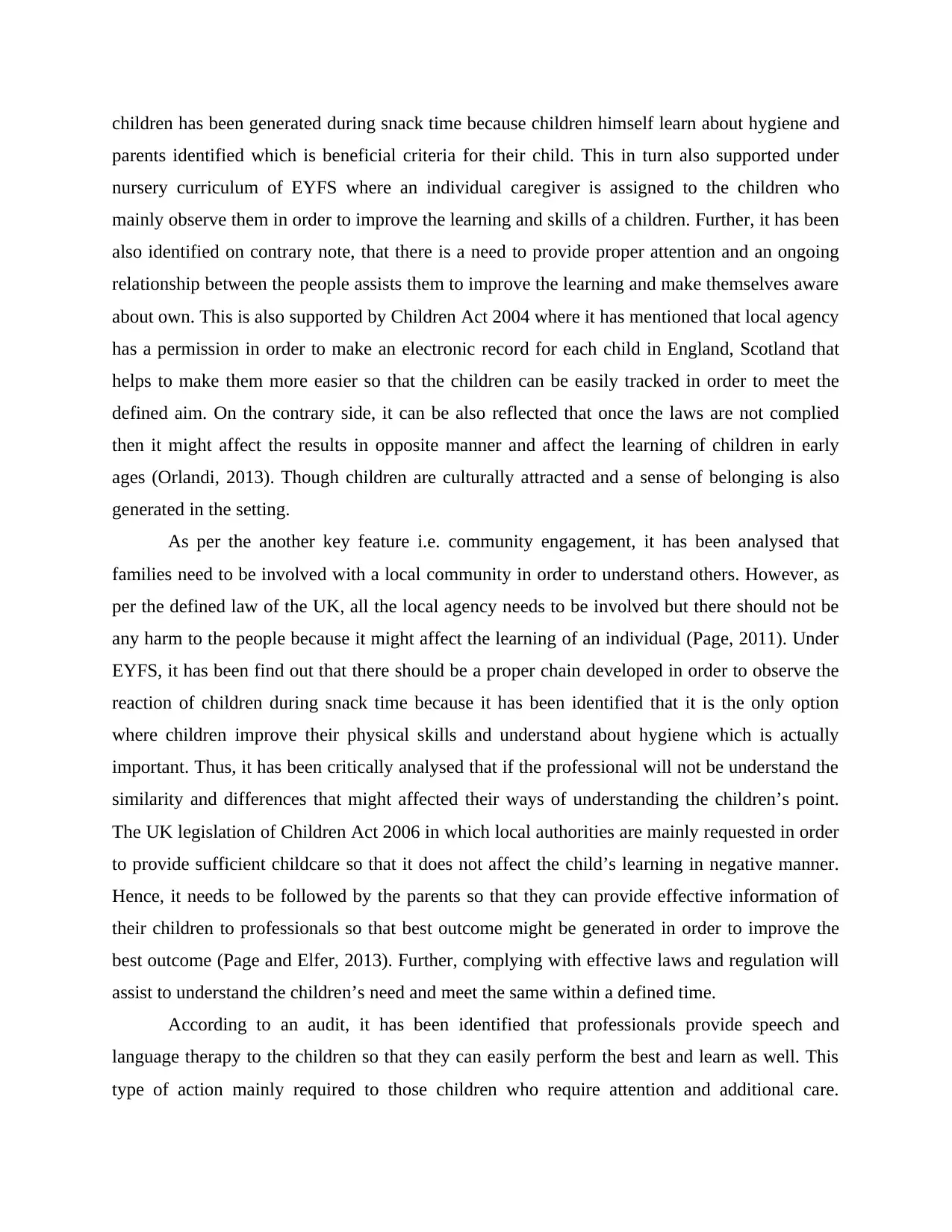
children has been generated during snack time because children himself learn about hygiene and
parents identified which is beneficial criteria for their child. This in turn also supported under
nursery curriculum of EYFS where an individual caregiver is assigned to the children who
mainly observe them in order to improve the learning and skills of a children. Further, it has been
also identified on contrary note, that there is a need to provide proper attention and an ongoing
relationship between the people assists them to improve the learning and make themselves aware
about own. This is also supported by Children Act 2004 where it has mentioned that local agency
has a permission in order to make an electronic record for each child in England, Scotland that
helps to make them more easier so that the children can be easily tracked in order to meet the
defined aim. On the contrary side, it can be also reflected that once the laws are not complied
then it might affect the results in opposite manner and affect the learning of children in early
ages (Orlandi, 2013). Though children are culturally attracted and a sense of belonging is also
generated in the setting.
As per the another key feature i.e. community engagement, it has been analysed that
families need to be involved with a local community in order to understand others. However, as
per the defined law of the UK, all the local agency needs to be involved but there should not be
any harm to the people because it might affect the learning of an individual (Page, 2011). Under
EYFS, it has been find out that there should be a proper chain developed in order to observe the
reaction of children during snack time because it has been identified that it is the only option
where children improve their physical skills and understand about hygiene which is actually
important. Thus, it has been critically analysed that if the professional will not be understand the
similarity and differences that might affected their ways of understanding the children’s point.
The UK legislation of Children Act 2006 in which local authorities are mainly requested in order
to provide sufficient childcare so that it does not affect the child’s learning in negative manner.
Hence, it needs to be followed by the parents so that they can provide effective information of
their children to professionals so that best outcome might be generated in order to improve the
best outcome (Page and Elfer, 2013). Further, complying with effective laws and regulation will
assist to understand the children’s need and meet the same within a defined time.
According to an audit, it has been identified that professionals provide speech and
language therapy to the children so that they can easily perform the best and learn as well. This
type of action mainly required to those children who require attention and additional care.
parents identified which is beneficial criteria for their child. This in turn also supported under
nursery curriculum of EYFS where an individual caregiver is assigned to the children who
mainly observe them in order to improve the learning and skills of a children. Further, it has been
also identified on contrary note, that there is a need to provide proper attention and an ongoing
relationship between the people assists them to improve the learning and make themselves aware
about own. This is also supported by Children Act 2004 where it has mentioned that local agency
has a permission in order to make an electronic record for each child in England, Scotland that
helps to make them more easier so that the children can be easily tracked in order to meet the
defined aim. On the contrary side, it can be also reflected that once the laws are not complied
then it might affect the results in opposite manner and affect the learning of children in early
ages (Orlandi, 2013). Though children are culturally attracted and a sense of belonging is also
generated in the setting.
As per the another key feature i.e. community engagement, it has been analysed that
families need to be involved with a local community in order to understand others. However, as
per the defined law of the UK, all the local agency needs to be involved but there should not be
any harm to the people because it might affect the learning of an individual (Page, 2011). Under
EYFS, it has been find out that there should be a proper chain developed in order to observe the
reaction of children during snack time because it has been identified that it is the only option
where children improve their physical skills and understand about hygiene which is actually
important. Thus, it has been critically analysed that if the professional will not be understand the
similarity and differences that might affected their ways of understanding the children’s point.
The UK legislation of Children Act 2006 in which local authorities are mainly requested in order
to provide sufficient childcare so that it does not affect the child’s learning in negative manner.
Hence, it needs to be followed by the parents so that they can provide effective information of
their children to professionals so that best outcome might be generated in order to improve the
best outcome (Page and Elfer, 2013). Further, complying with effective laws and regulation will
assist to understand the children’s need and meet the same within a defined time.
According to an audit, it has been identified that professionals provide speech and
language therapy to the children so that they can easily perform the best and learn as well. This
type of action mainly required to those children who require attention and additional care.
Paraphrase This Document
Need a fresh take? Get an instant paraphrase of this document with our AI Paraphraser
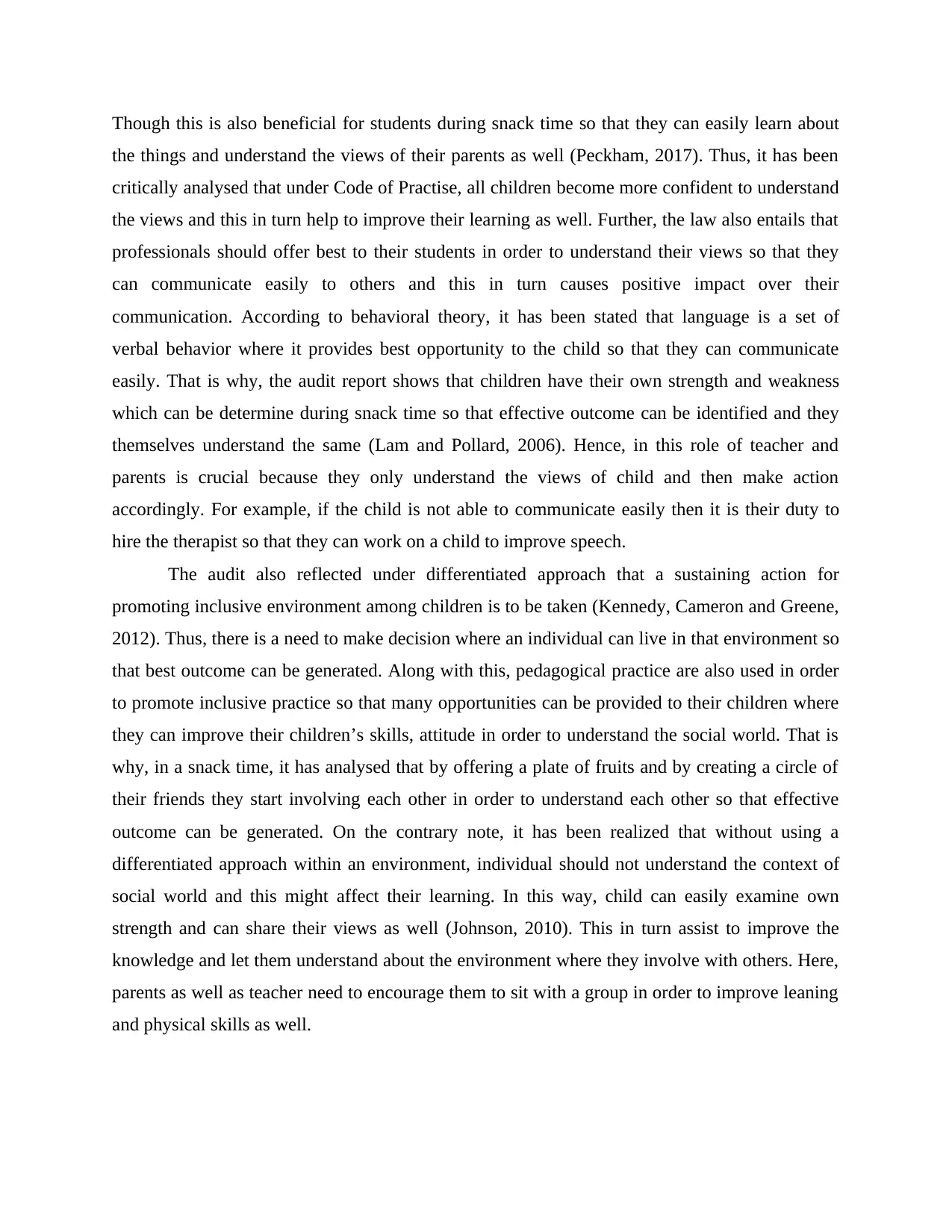
Though this is also beneficial for students during snack time so that they can easily learn about
the things and understand the views of their parents as well (Peckham, 2017). Thus, it has been
critically analysed that under Code of Practise, all children become more confident to understand
the views and this in turn help to improve their learning as well. Further, the law also entails that
professionals should offer best to their students in order to understand their views so that they
can communicate easily to others and this in turn causes positive impact over their
communication. According to behavioral theory, it has been stated that language is a set of
verbal behavior where it provides best opportunity to the child so that they can communicate
easily. That is why, the audit report shows that children have their own strength and weakness
which can be determine during snack time so that effective outcome can be identified and they
themselves understand the same (Lam and Pollard, 2006). Hence, in this role of teacher and
parents is crucial because they only understand the views of child and then make action
accordingly. For example, if the child is not able to communicate easily then it is their duty to
hire the therapist so that they can work on a child to improve speech.
The audit also reflected under differentiated approach that a sustaining action for
promoting inclusive environment among children is to be taken (Kennedy, Cameron and Greene,
2012). Thus, there is a need to make decision where an individual can live in that environment so
that best outcome can be generated. Along with this, pedagogical practice are also used in order
to promote inclusive practice so that many opportunities can be provided to their children where
they can improve their children’s skills, attitude in order to understand the social world. That is
why, in a snack time, it has analysed that by offering a plate of fruits and by creating a circle of
their friends they start involving each other in order to understand each other so that effective
outcome can be generated. On the contrary note, it has been realized that without using a
differentiated approach within an environment, individual should not understand the context of
social world and this might affect their learning. In this way, child can easily examine own
strength and can share their views as well (Johnson, 2010). This in turn assist to improve the
knowledge and let them understand about the environment where they involve with others. Here,
parents as well as teacher need to encourage them to sit with a group in order to improve leaning
and physical skills as well.
the things and understand the views of their parents as well (Peckham, 2017). Thus, it has been
critically analysed that under Code of Practise, all children become more confident to understand
the views and this in turn help to improve their learning as well. Further, the law also entails that
professionals should offer best to their students in order to understand their views so that they
can communicate easily to others and this in turn causes positive impact over their
communication. According to behavioral theory, it has been stated that language is a set of
verbal behavior where it provides best opportunity to the child so that they can communicate
easily. That is why, the audit report shows that children have their own strength and weakness
which can be determine during snack time so that effective outcome can be identified and they
themselves understand the same (Lam and Pollard, 2006). Hence, in this role of teacher and
parents is crucial because they only understand the views of child and then make action
accordingly. For example, if the child is not able to communicate easily then it is their duty to
hire the therapist so that they can work on a child to improve speech.
The audit also reflected under differentiated approach that a sustaining action for
promoting inclusive environment among children is to be taken (Kennedy, Cameron and Greene,
2012). Thus, there is a need to make decision where an individual can live in that environment so
that best outcome can be generated. Along with this, pedagogical practice are also used in order
to promote inclusive practice so that many opportunities can be provided to their children where
they can improve their children’s skills, attitude in order to understand the social world. That is
why, in a snack time, it has analysed that by offering a plate of fruits and by creating a circle of
their friends they start involving each other in order to understand each other so that effective
outcome can be generated. On the contrary note, it has been realized that without using a
differentiated approach within an environment, individual should not understand the context of
social world and this might affect their learning. In this way, child can easily examine own
strength and can share their views as well (Johnson, 2010). This in turn assist to improve the
knowledge and let them understand about the environment where they involve with others. Here,
parents as well as teacher need to encourage them to sit with a group in order to improve leaning
and physical skills as well.
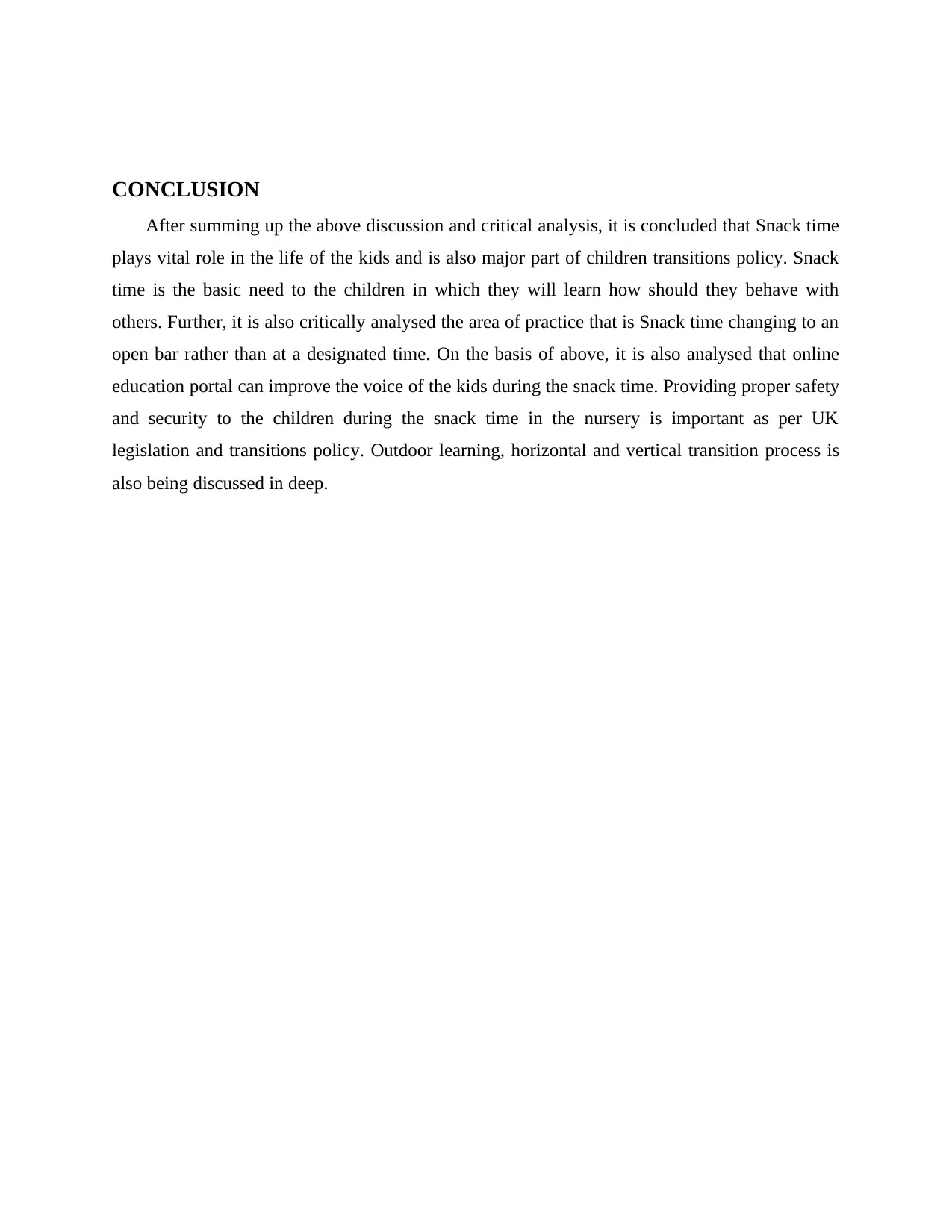
CONCLUSION
After summing up the above discussion and critical analysis, it is concluded that Snack time
plays vital role in the life of the kids and is also major part of children transitions policy. Snack
time is the basic need to the children in which they will learn how should they behave with
others. Further, it is also critically analysed the area of practice that is Snack time changing to an
open bar rather than at a designated time. On the basis of above, it is also analysed that online
education portal can improve the voice of the kids during the snack time. Providing proper safety
and security to the children during the snack time in the nursery is important as per UK
legislation and transitions policy. Outdoor learning, horizontal and vertical transition process is
also being discussed in deep.
After summing up the above discussion and critical analysis, it is concluded that Snack time
plays vital role in the life of the kids and is also major part of children transitions policy. Snack
time is the basic need to the children in which they will learn how should they behave with
others. Further, it is also critically analysed the area of practice that is Snack time changing to an
open bar rather than at a designated time. On the basis of above, it is also analysed that online
education portal can improve the voice of the kids during the snack time. Providing proper safety
and security to the children during the snack time in the nursery is important as per UK
legislation and transitions policy. Outdoor learning, horizontal and vertical transition process is
also being discussed in deep.
⊘ This is a preview!⊘
Do you want full access?
Subscribe today to unlock all pages.

Trusted by 1+ million students worldwide
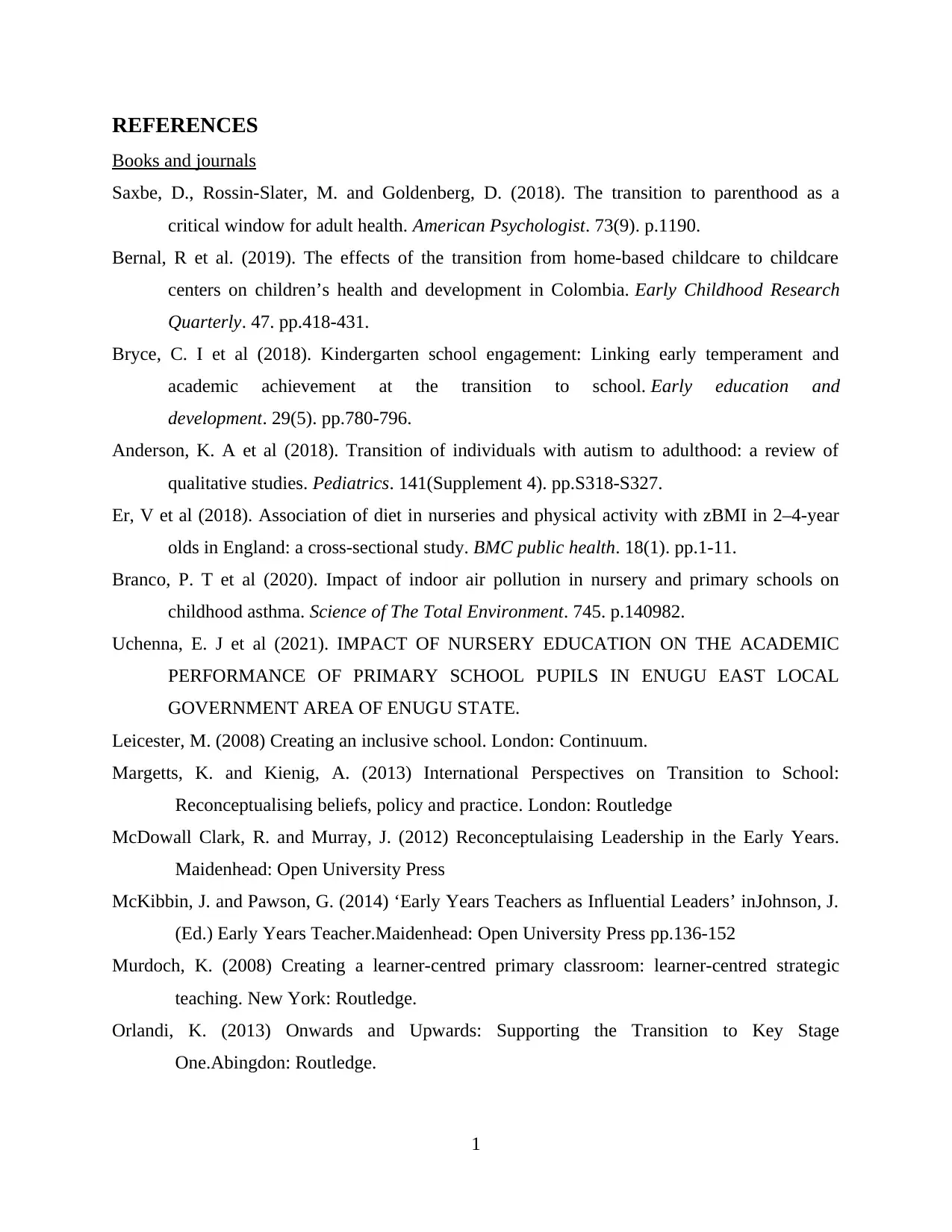
REFERENCES
Books and journals
Saxbe, D., Rossin-Slater, M. and Goldenberg, D. (2018). The transition to parenthood as a
critical window for adult health. American Psychologist. 73(9). p.1190.
Bernal, R et al. (2019). The effects of the transition from home-based childcare to childcare
centers on children’s health and development in Colombia. Early Childhood Research
Quarterly. 47. pp.418-431.
Bryce, C. I et al (2018). Kindergarten school engagement: Linking early temperament and
academic achievement at the transition to school. Early education and
development. 29(5). pp.780-796.
Anderson, K. A et al (2018). Transition of individuals with autism to adulthood: a review of
qualitative studies. Pediatrics. 141(Supplement 4). pp.S318-S327.
Er, V et al (2018). Association of diet in nurseries and physical activity with zBMI in 2–4-year
olds in England: a cross-sectional study. BMC public health. 18(1). pp.1-11.
Branco, P. T et al (2020). Impact of indoor air pollution in nursery and primary schools on
childhood asthma. Science of The Total Environment. 745. p.140982.
Uchenna, E. J et al (2021). IMPACT OF NURSERY EDUCATION ON THE ACADEMIC
PERFORMANCE OF PRIMARY SCHOOL PUPILS IN ENUGU EAST LOCAL
GOVERNMENT AREA OF ENUGU STATE.
Leicester, M. (2008) Creating an inclusive school. London: Continuum.
Margetts, K. and Kienig, A. (2013) International Perspectives on Transition to School:
Reconceptualising beliefs, policy and practice. London: Routledge
McDowall Clark, R. and Murray, J. (2012) Reconceptulaising Leadership in the Early Years.
Maidenhead: Open University Press
McKibbin, J. and Pawson, G. (2014) ‘Early Years Teachers as Influential Leaders’ inJohnson, J.
(Ed.) Early Years Teacher.Maidenhead: Open University Press pp.136-152
Murdoch, K. (2008) Creating a learner-centred primary classroom: learner-centred strategic
teaching. New York: Routledge.
Orlandi, K. (2013) Onwards and Upwards: Supporting the Transition to Key Stage
One.Abingdon: Routledge.
1
Books and journals
Saxbe, D., Rossin-Slater, M. and Goldenberg, D. (2018). The transition to parenthood as a
critical window for adult health. American Psychologist. 73(9). p.1190.
Bernal, R et al. (2019). The effects of the transition from home-based childcare to childcare
centers on children’s health and development in Colombia. Early Childhood Research
Quarterly. 47. pp.418-431.
Bryce, C. I et al (2018). Kindergarten school engagement: Linking early temperament and
academic achievement at the transition to school. Early education and
development. 29(5). pp.780-796.
Anderson, K. A et al (2018). Transition of individuals with autism to adulthood: a review of
qualitative studies. Pediatrics. 141(Supplement 4). pp.S318-S327.
Er, V et al (2018). Association of diet in nurseries and physical activity with zBMI in 2–4-year
olds in England: a cross-sectional study. BMC public health. 18(1). pp.1-11.
Branco, P. T et al (2020). Impact of indoor air pollution in nursery and primary schools on
childhood asthma. Science of The Total Environment. 745. p.140982.
Uchenna, E. J et al (2021). IMPACT OF NURSERY EDUCATION ON THE ACADEMIC
PERFORMANCE OF PRIMARY SCHOOL PUPILS IN ENUGU EAST LOCAL
GOVERNMENT AREA OF ENUGU STATE.
Leicester, M. (2008) Creating an inclusive school. London: Continuum.
Margetts, K. and Kienig, A. (2013) International Perspectives on Transition to School:
Reconceptualising beliefs, policy and practice. London: Routledge
McDowall Clark, R. and Murray, J. (2012) Reconceptulaising Leadership in the Early Years.
Maidenhead: Open University Press
McKibbin, J. and Pawson, G. (2014) ‘Early Years Teachers as Influential Leaders’ inJohnson, J.
(Ed.) Early Years Teacher.Maidenhead: Open University Press pp.136-152
Murdoch, K. (2008) Creating a learner-centred primary classroom: learner-centred strategic
teaching. New York: Routledge.
Orlandi, K. (2013) Onwards and Upwards: Supporting the Transition to Key Stage
One.Abingdon: Routledge.
1
Paraphrase This Document
Need a fresh take? Get an instant paraphrase of this document with our AI Paraphraser
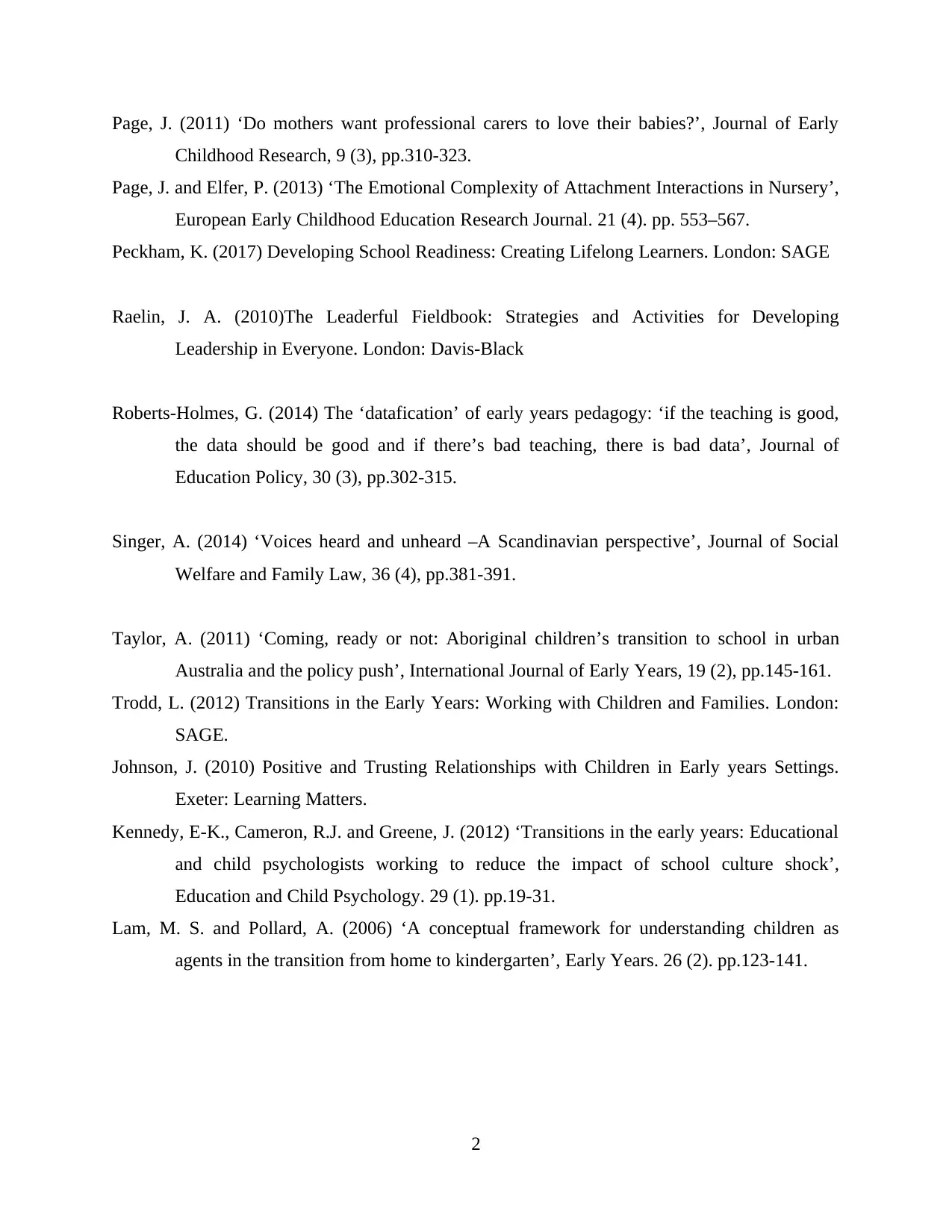
Page, J. (2011) ‘Do mothers want professional carers to love their babies?’, Journal of Early
Childhood Research, 9 (3), pp.310-323.
Page, J. and Elfer, P. (2013) ‘The Emotional Complexity of Attachment Interactions in Nursery’,
European Early Childhood Education Research Journal. 21 (4). pp. 553–567.
Peckham, K. (2017) Developing School Readiness: Creating Lifelong Learners. London: SAGE
Raelin, J. A. (2010)The Leaderful Fieldbook: Strategies and Activities for Developing
Leadership in Everyone. London: Davis-Black
Roberts-Holmes, G. (2014) The ‘datafication’ of early years pedagogy: ‘if the teaching is good,
the data should be good and if there’s bad teaching, there is bad data’, Journal of
Education Policy, 30 (3), pp.302-315.
Singer, A. (2014) ‘Voices heard and unheard –A Scandinavian perspective’, Journal of Social
Welfare and Family Law, 36 (4), pp.381-391.
Taylor, A. (2011) ‘Coming, ready or not: Aboriginal children’s transition to school in urban
Australia and the policy push’, International Journal of Early Years, 19 (2), pp.145-161.
Trodd, L. (2012) Transitions in the Early Years: Working with Children and Families. London:
SAGE.
Johnson, J. (2010) Positive and Trusting Relationships with Children in Early years Settings.
Exeter: Learning Matters.
Kennedy, E-K., Cameron, R.J. and Greene, J. (2012) ‘Transitions in the early years: Educational
and child psychologists working to reduce the impact of school culture shock’,
Education and Child Psychology. 29 (1). pp.19-31.
Lam, M. S. and Pollard, A. (2006) ‘A conceptual framework for understanding children as
agents in the transition from home to kindergarten’, Early Years. 26 (2). pp.123-141.
2
Childhood Research, 9 (3), pp.310-323.
Page, J. and Elfer, P. (2013) ‘The Emotional Complexity of Attachment Interactions in Nursery’,
European Early Childhood Education Research Journal. 21 (4). pp. 553–567.
Peckham, K. (2017) Developing School Readiness: Creating Lifelong Learners. London: SAGE
Raelin, J. A. (2010)The Leaderful Fieldbook: Strategies and Activities for Developing
Leadership in Everyone. London: Davis-Black
Roberts-Holmes, G. (2014) The ‘datafication’ of early years pedagogy: ‘if the teaching is good,
the data should be good and if there’s bad teaching, there is bad data’, Journal of
Education Policy, 30 (3), pp.302-315.
Singer, A. (2014) ‘Voices heard and unheard –A Scandinavian perspective’, Journal of Social
Welfare and Family Law, 36 (4), pp.381-391.
Taylor, A. (2011) ‘Coming, ready or not: Aboriginal children’s transition to school in urban
Australia and the policy push’, International Journal of Early Years, 19 (2), pp.145-161.
Trodd, L. (2012) Transitions in the Early Years: Working with Children and Families. London:
SAGE.
Johnson, J. (2010) Positive and Trusting Relationships with Children in Early years Settings.
Exeter: Learning Matters.
Kennedy, E-K., Cameron, R.J. and Greene, J. (2012) ‘Transitions in the early years: Educational
and child psychologists working to reduce the impact of school culture shock’,
Education and Child Psychology. 29 (1). pp.19-31.
Lam, M. S. and Pollard, A. (2006) ‘A conceptual framework for understanding children as
agents in the transition from home to kindergarten’, Early Years. 26 (2). pp.123-141.
2

3
⊘ This is a preview!⊘
Do you want full access?
Subscribe today to unlock all pages.

Trusted by 1+ million students worldwide
1 out of 12
Related Documents
Your All-in-One AI-Powered Toolkit for Academic Success.
+13062052269
info@desklib.com
Available 24*7 on WhatsApp / Email
![[object Object]](/_next/static/media/star-bottom.7253800d.svg)
Unlock your academic potential
Copyright © 2020–2026 A2Z Services. All Rights Reserved. Developed and managed by ZUCOL.



